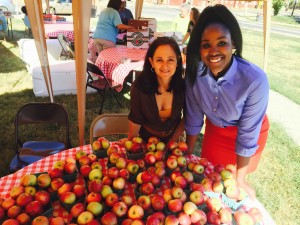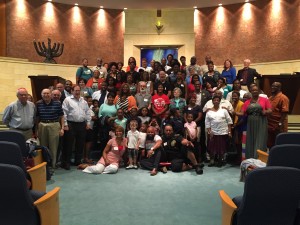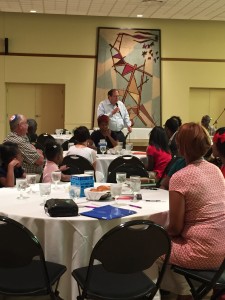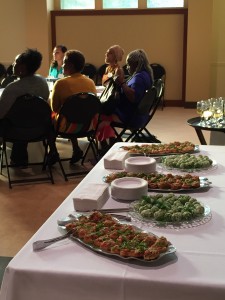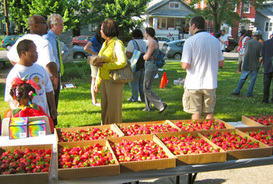New Roots Interfaith Food Justice Initiative
In an attempt to address Louisville’s inner city food insecurity issues, New Roots partnered with Congregation Adath Jeshurun (Congregation AJ), a Conservative Synagogue and their Preschool, and Pleasant View Baptist Church, an African American Church and their Cherish Forever Preschool, to ensure the consumption of farm-fresh fruits and vegetables through increased participation in the New Roots Fresh Stop Project and other programs. At the same time, New Roots worked toward developing an increased understanding of the historical relationship between Jews and African Americans in Louisville, KY, as well as a plan to bring these two communities back together to work toward social justice and spiritual, physical, and emotional healing, using food justice as an entry point.
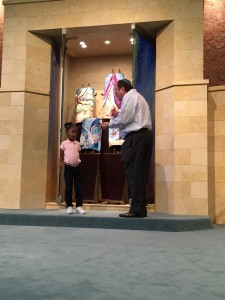
“[This project] has lifted the veil that had separated him from the reality and complexity of food insecurity faced by many in their community.”
New Roots also organized three interfaith events: a dinner/food justice workshop at Living Faith Christian Ministries (80 total people attended); a dinner and interfaith discussion at Congregation AJ (100 people attended); and a Selichot/Prayer Service at Congregation AJ (55 people attended). The first event at Living Faith included an account of the very first integrated lunch counter in the Jewish community by the gentleman who owned the pharmacy, and testimony from an African American woman describing her first experience at an integrated lunch counter. This was the first time anyone in the room remembered being in a diverse space with frank discussions about social/food justice in Louisville. This historic event utilized participatory democratic principles to get people talking about food justice and it worked!
The second event was an opportunity for non-Jews to tour a synagogue for the first time. It was a deep learning experience for everyone involved and increased understanding and compassion between Jews and Christians in Louisville.
The Selichot Service was entirely about food justice and was facilitated by African American food justice leaders in partnership with Cantor Lipp. It included spoken word, R&B versions of Hebrew prayers, and a fiery sermon by a Fresh Stop site pastor about how New Roots has removed apathy and resistance from their community.
The multiplier effect this initiative has had on the community has been enormous. One of the most important and long lasting is the effect on the Jewish response to hunger. Many members of this community are no longer content to simply show up once a year on Yom Kippur with a can of processed food to give “to the needy.” They now have a much deeper understanding that fresh food is a right, not a charity, and are walking this talk by participating and helping to lead the Parkland Fresh Stop. Rabbi Slosberg has said that knowing part of his share cost goes to subsidize a family who cannot afford to purchase fresh food otherwise, plus understanding that both his family and the other family are eating the same exact food over the coming week (as opposed to him merely fostering the consumption of processed food by a food insecure family while he goes shopping at a grocery store) has lifted the veil that had separated him from the reality and complexity of food insecurity faced by many in their community. Finally, Rabbi Slosberg focused his Rosh Hoshanah and Yom Kippur sermons on food justice this year.
One of the most exciting outcomes of this initiative is that another synagogue has been inspired to replicate this project! This new synagogue will become higher end shareholders at another Fresh Stop in 2016. In addition, the Jewish Community of Louisville (JCL) and New Roots are partnering on a JOFEE Fellowship grant to help a young Jewish community member step into a food justice organizing role in 2016. Their hope is to have a Jewish Community Fresh Stop in 2017. Finally, a recent write up about this Gendler Grapevine Project initiative made its way to a funder in Michigan, who has reached out to New Roots with plans to support a Double Up (SNAP Benefits) program in Kentucky.
One of the most exciting outcomes of this initiative is that another synagogue has been inspired to replicate this project! This new synagogue will become higher end shareholders at another Fresh Stop in 2016. In addition, a recent write up about this Gendler Grapevine Project initiative made its way to a funder in Michigan, who has reached out to New Roots with plans to support a Double Up (SNAP Benefits) program in Kentucky.
The idea that Jews must pursue—in fact run after—justice, is at the core of this initiative. This theme also guides the work at New Roots. They understand that the meaning of the word tzedakah is not about an act of condescension from one person to another who is in need. It is the fulfillment of a mitzvah, a commandment, to a fellow human being who has equal status before God. Although Jewish tradition recognizes that the sharing of our resources is also an act of love—as the Torah states, “Love thy neighbor as thyself” (Lev.19:18), it emphasizes that this act of sharing is an act of justice. They do not believe that people are “under-served,” “needy,” or that they need to “empower” them.
After seven years of New Roots being in community with families facing limited resources and a lack of fresh food, a different picture has emerged. Their leaders and shareholders live in communities with purposeful limited investment, but also have the inherent power to work for a new vision. They do not need New Roots to give them this power. Instead, they look to New Roots as equal partners in connecting to resources, sharing knowledge, and building an alternative to these unjust systems.

